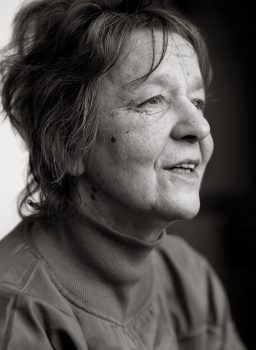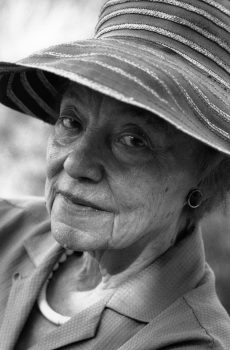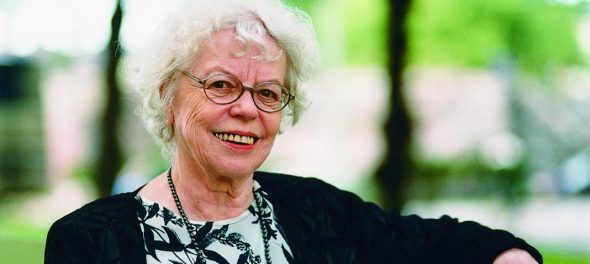Tag: poetry
Alone here
Issue 1/1989 | Archives online, Fiction, poetry
Gösta Ågren has published a couple of dozen volumes of poetry; Jär (the title is a dialect word meaning ‘here’) won the Finlandia Prize in 1989. Ågren’s earlier poems have been epic, tinged with Marxism, in the style of Whitman and Neruda. Gradually his has become more strongly linguistically concentrated, developed towards a more conventionally lyrical style questioning the problem of existence. He himself has expressed the matter in one of the paradoxical statements he particularly enjoys: ‘don’t worry / it will never work out.’ Introduction by Erkka Lehtola
Here
Here she came, through the motion
less Sunday of old age.
In headscarf and long skirt
she came, a tall bird
of clothes. She wondered in
the sunlight on the shed-hill
what she should do
so she could die. I must
write about this. For it happens
everywhere, and there are no
questions to answer. But questioning
is already insight. Only
those questions that are never asked
need answers. I remember
that her hands were no longer
part of her. Idle
they lay in her lap. She saw
with her eyes only darkness
and light. It was silent. I
thought: the silence is creeping
through her body. Soon
it will reach her heart. Soon
I will be alone
here. More…
Where have I gone?
Issue 2/1988 | Archives online, Fiction, poetry
Poems from Näköisveistos ruumiskirstusta (‘An effigy of a coffin’, 1987). Introduction by Erkka Lehtola
The maple is being stripped for nesting materials
by big crow and his lady.
Their endeavours are more pleasing
than the imminent drinking party, in a finished house
in celebration of early spring. Dreary, to know
in advance that one is insulting one’s guests
– and not even in a constructive manner. More…
Caravans of winds
Issue 2/1988 | Archives online, Fiction, poetry
Poems from three collections. Introduction by Kaija Valkonen
The river of death froze
It froze, the river of death, froze too the boat of death in the nights of the Winter War, in the Winter War's nights. The men shed blood, shed blood , and it froze, the river of death. In the nights of the Winter War, it froze, the river of death.
Day of mourning
For one day I’ve the right to mourn,
for one day I’ll shut the windows of the sky,
I’ll dismiss the blue,
I’ll raise a black sun to mark my mourning.
For one day I’ll wilt the flowers,
for one day I’ll silence the birds. More…
In my memory
Issue 4/1987 | Archives online, Fiction, poetry
Poems and aphorisms from four collections. Introduction by Erkka Lehtola
Let the healing epidemics out! There must be some.
The many-headed monster, the market ideology, it can simultaneously read, count and even write at least 666 works. And without the sign of the beast no one can buy or sell.
Those who can read know you only realise you’ve forgotten how
when you can do it again.
What a handsome winter we have here! If it weren’t so dark, we’d see it. We could orientate ourselves on the stars with the beam from a pocket torch. Somewhere in mid-sky, I’d say, they come flying along on long lights.
As a child I said I’ll do what I want. Now I want what I do.
Who’s in the middle when the two sides of your face are side by side, as they are, in the mirror.
The trees that hide the sun are bright inside.
A frosty night when you feel the stars on your skin and discuss what you’re wearing.
Somebody’s walking over there, with an umbrella over his head, taking the rain for a walk.
I’m so delighted to find so much that’s useless.
What a relief there’s no longer enough time to get acquainted.
From Tuoreessa muistissa kevät (‘Springtime fresh in the memory’), 1987 More…
Mickeys
Issue 4/1987 | Archives online, Fiction, Prose
Maskuja (‘Mickeys’, WSOY, 1987). Introduction by Erkka Lehtola
When I was on a trip with my friend and there was a wide enough bed in the southern night for the two of us to sleep easily side by side, it was a big shock when, even so, I sprang up suddenly at midnight, and my friend did too, and there was a thud as our heads banged together and we saw stars, and in the morning no one could understand why we were so stupefied.
Micky ran to the barber’s. ‘Are you free? Could you do something with my hair?’ He took his cap off. ‘Look, all the hairs are loose at the other end.’
Once, out of sheer absent-mindedness, he was officiously helping someone onto a tram from behind; he grabbed their bottom, got a furious look, and spluttered,’ Sorry, but I thought it was your bag.’ More…
Poems, poèmes
Issue 2/1987 | Archives online, Fiction, poetry
Poems from Mies joka rakasti vaimoaan liikaa (‘The man who loved his wife too much’, 1979 and Vaikka on kesä (‘Although it’s summer’, 1983). Interview by Markku Huotari
Look at this epitaph with whiskers.
Threw herself so gladly into my troubles, sometimes she seemed to be bearing, properly, my burdens.
A dog called Julia. Combining
July and Yuletide.
Often thought of putting her down, so she wouldn’t need to die.
Smash her skull or break her neck
with my own hands, to stop her mourning her premature death.
Which still seems to be delaying.
She puts her four paws gently down, one at a time. So the Lord won’t hear her still about
and whisk her away.
Two years ago, she steps on some glass, her toe sticks out, a tendon’s cut.
She looks at me. Believe it or not,
I’m grieved by little Julia’s lot: for a second
I think the blood’s dripping from my own heart. More…
A Note on Nine Contemporary Poems from Finland
Issue 1/1987 | Archives online, Articles, Fiction, Non-fiction, poetry
Contemporary Finnish poetry, translated and introduced by Anselm Hollo
The last couple of months, it has been my pleasure to browse around in a tightly packed shelf of books of poetry published in Finland in the last five years. On the showing of these, and of the excellent anthology Modern finlandssvensk lyrik (‘Modern Finland-Swedish poetry’, 1980), edited by Claes Andersson and Bo Carpelan, poetry certainly seems to be alive and well in the old homeland. In a way, the sheaf translated here is just first travel notes, individual works that struck my fancy seemed translatable: thus, by no means a ‘representative selection’.
Claes Andersson’s poem ‘When I was born, Helsinki was…’ was quite simply a direct hit (perhaps an unfortunate metaphor in that it deals, in part, with the WW2 air raids on Helsinki) – it brought back personal memories from my early childhood. But beyond those immediate circumstances, it is also a very moving evocation of the magnificent and terrifying world of magic children inhabit. Helena Anhava’s ‘These years…’, with its marvelous image of the great hinge turning in the human psyche at certain points familiar to anyone who has lived into middle age, seemed a fine example of her impressive body of meditative lyric poems, sharing a tenor of wistfulness not uncommon in Finland’s poetry with Bo Carpelan’s ‘You drive up…’, which is also a poem of the pangs of change. In Carpelan’s text, the clash between ‘wonderful clear Vivaldi’ on the protagonist’s car radio and the perceived tawdriness of the environment is beautifully balanced between genuine revulsion for the latter and a self-irony directed against the self-declared ‘finer sensibilities’ of the class that can afford them. Tua Forsström‘s ‘Do you want to hear something’ moves in a lovely dance figure from myth to everyday present: we see the interior world that is Nausicaa’s island shimmering through the exterior in which ‘someone’s/ balcony door whines all night like a cat’. More…
Poems
Issue 4/1986 | Archives online, Fiction, poetry
Introduction by Kai Laitinen
Evening Mood
It’s widening:
an evening like a sigh –
languidly spreading across the land.
The tree’s unclothing
its branches of their colours, darkening.
As if something somewhere
were ringing and ringing –
a song straying like an orphan.
The words seem
something I’ve heard:
‘only a shadow –
only a shadow of a dream’
It’s slipping away. It’s dwindling.
Everything – everything – I’ve been given
I’ll give away. More…



